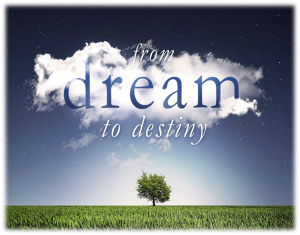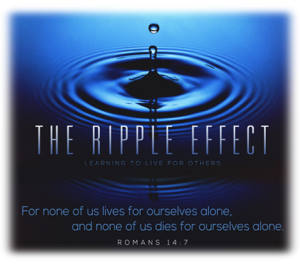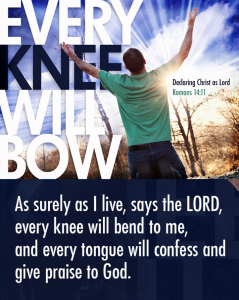ROMANS 14: WHO’S JUDGING?
Some time back, we were confused and needing help from a trusted friend. He said something that not only helped us in making a particular choice at the time, but his advice has stayed with us ever since. It’s crossed over into many other situations where a decision has needed a firm foundation, for weathering future consequences. His advice was simple: “You need to be faithful to the revelation that God has given to you.” In other words, if I’m convinced about a choice, I need to back it up with Scripture first, to ensure that it is, in fact, ‘a revelation from God’. [v12]
This is what Jesus meant when He talked about the wise man building his house on the rock or, the foolish man building his house on sand.[a] Without a right foundation for any choice, and that foundation based on the Creator God’s Handbook for LIFE, we’ll not we able to weather the future consequences inevitably caused by our choices.
Today’s chapter, taken from a 1st Century letter to those living in Rome, picks up on the simple issue of food and, the right/wrong impact that something as simple as food, can have on people around us. 1,948+/- years later, this chapter holds key principles for anyone wanting to follow the Creator God today. But to understand how food fits into the grand scheme of things, it’s important to go back to The Beginning.
In The Beginning, humanity was created to rule over our environment – including ruling over one’s self. One simple rule was given to us – not to consume from a certain tree. With that small task, came a  daily practice to rule over our self-will.[b] To make choices, and choose to obey our God-given conscience (which was aware of the rule), we began ruling over our natural desires. Putting one’s self second, and our Maker’s wishes first, also gave us that one single point where a distinction was evident – that we’re the image, and He’s the original. At the same time, no rule = no gauge. Without a gauge there’s no proof that we’re fully functioning as we’d been designed to function. And, if we can’t rule over ourselves, even in the smallest of tasks, how can we govern our environment on the largest scale.
daily practice to rule over our self-will.[b] To make choices, and choose to obey our God-given conscience (which was aware of the rule), we began ruling over our natural desires. Putting one’s self second, and our Maker’s wishes first, also gave us that one single point where a distinction was evident – that we’re the image, and He’s the original. At the same time, no rule = no gauge. Without a gauge there’s no proof that we’re fully functioning as we’d been designed to function. And, if we can’t rule over ourselves, even in the smallest of tasks, how can we govern our environment on the largest scale.
With a conscience, free choice, and then given “the knowledge of good and evil”, our Creator God has let loose 7 billion images of Himself on the world. Exercising His faith in us, the plan was that we’d behave as He would in any given situation. We’d speak out things that He’d say if He were us. And, just as we were designed to, as images of Himself, we’d think and see things His way…
So then, having ensured that I’ve got the instruction right for me (whatever that life policy is) and after ensuring that, between me and my Maker, this is the way I should conduct myself through daily choices; then, after being consistently faithful to it, and not swayed by every wind of teaching[c], I’m now responsible to rule (take good leadership) over what’s around me. If, for example, I’m convinced about a life-policy, whether that is to be a vegetarian, a vegan, avoiding pork, or being a meat eater, I need to back up the reasoning behind that choice, using my Creator’s Handbook for LIFE. But if it’s a simple choice, is that choice conflicting with my Creator’s Handbook? With me sorted, there’s more things to consider for those living/working around me…
I can advise others because of the revelation that God has given to me. After all, it would be wrong to remain silent and not advise others, just as our friend helped us to implement a clear decision-making process all those years ago. Someone who has come into the knowledge of animal abuse at meat factories, is likely to share that knowledge with friends who eat meat. The hope is that they too may draw lifestyle choices from this new piece of knowledge.
Advising others is not judgement. While I know that I can’t judge the next person for the choices they make, I shouldn’t be silenced or intimidated, not to share my knowledge and advice. They need to now be faithful to the revelation that God has given to them through me. Jesus, by the Power of the Creator God’s Holy Spirit, will do His best to make that person stand on their own two feet. [v4]
If I’m convinced, for myself, are my choices and actions causing people around me to stumble and fall? [v14] Just because it’s right for me, I can’t just go ahead if my actions are destabilizing the Faith of those around me, or my relationships with them. [v16&17] In this portion of Paul’s letter, he started with something as simple as food. But the framework for how we come to a choice, and how we execute that choice in front of people, is transferable right across our life experience.
Silence isn’t an option. I may not do it myself (and I wouldn’t teach my own kids to do it because, in my heart I feel it’s wrong), but I accept others doing it. “Blessed is the man who does not condemn himself (before his Creator God who’ll judge the whole world) by what he approves – whether explicitly in my actions and words, or implicitly by my silence. [v22]
The concept of silence being by default, a form of “approval”, had become clear in WWII Germany. In his famous speech (often laid out as a poem) First They Came, Martin Niemöller made the point that the general public (including himself) had been complicit, through their silence, in the Nazi imprisonment, persecution, and murder of millions of people. While Hitler’s “evolution of race” policies only affected the socialists, the disabled and incurable, the homosexual, Trade Unionists and Jews, the silence of those not affected (those in fear of losing their relationships, their freedom, or their own life) who had lost their voice and not spoken up, cannot be excused. If it happened before, then it can happen again.
While our lifestyle choices today aren’t likely to be as big as the life-threatening moral choices faced in WWII, it’s still a fine tight-rope to walk.  I can be hailed as trendy for some choices today. Or, I can lose relationships for advocating the rightness or wrongness in other choices. As difficult as it may get, I have all the help I need – having been designed for LIFE and, having been given my Creator’s Holy Spirit. With my God-given commission to rule, and not allowing myself to be intimidated or over-ridden in my opinions, I can advise others on why a life-policy is good, or not good. I can’t judge the person (that’s God’s responsibility) but I can certainly judge the rightness or wrongness in a choice or course of action, then explain that to others.
I can be hailed as trendy for some choices today. Or, I can lose relationships for advocating the rightness or wrongness in other choices. As difficult as it may get, I have all the help I need – having been designed for LIFE and, having been given my Creator’s Holy Spirit. With my God-given commission to rule, and not allowing myself to be intimidated or over-ridden in my opinions, I can advise others on why a life-policy is good, or not good. I can’t judge the person (that’s God’s responsibility) but I can certainly judge the rightness or wrongness in a choice or course of action, then explain that to others.
In 1624, John Donne said: “No man is an Island, entire of itself; every man is a piece of the Continent, a  part of the main.” Because if this, we can’t say, “What you do is your business, and what I do is my business.” The ethical system that says, “What’s right is right because it’s right for me” is Egoism – rooted in our culture of Individualism. And, the ethical framework that says, “What’s right is right because it feels right”, is Emotivism – where emotion is the basis of right and wrong. But who’s judging?
part of the main.” Because if this, we can’t say, “What you do is your business, and what I do is my business.” The ethical system that says, “What’s right is right because it’s right for me” is Egoism – rooted in our culture of Individualism. And, the ethical framework that says, “What’s right is right because it feels right”, is Emotivism – where emotion is the basis of right and wrong. But who’s judging?
Humanity (human image-bearers of the Creator God) will only stand secure if we build our life on the rock of our Creator’s judgments – what His Handbook for LIFE deems to be right or wrong. But if you’re wondering how this can be measured, the very simple “rule of thumb”, which makes our choice over right/wrong possible, is in the moment when our spirit/conscience doubts.
 If we then ignore (and make a habit of ignoring) that God-given voice within (when deep down inside we know in our heart of hearts what’s right/wrong), we’re condemned, because our actions aren’t from faith in the One who made us. And, everything severed from “faith” (without an active, working relationship with our Maker) is “sin”. [v23] The strong (God Himself) has promised to help the weak (us) and we’re now called, in today’s chapter, to be strong enough that we’re in a position of helping the weak around us.
If we then ignore (and make a habit of ignoring) that God-given voice within (when deep down inside we know in our heart of hearts what’s right/wrong), we’re condemned, because our actions aren’t from faith in the One who made us. And, everything severed from “faith” (without an active, working relationship with our Maker) is “sin”. [v23] The strong (God Himself) has promised to help the weak (us) and we’re now called, in today’s chapter, to be strong enough that we’re in a position of helping the weak around us.
CLICK to return to today’s “Daily Breadcrumbs”
[a] Matthew 7:24-27
[b] Genesis 2:9,15-17
[c] Ephesians 4:14